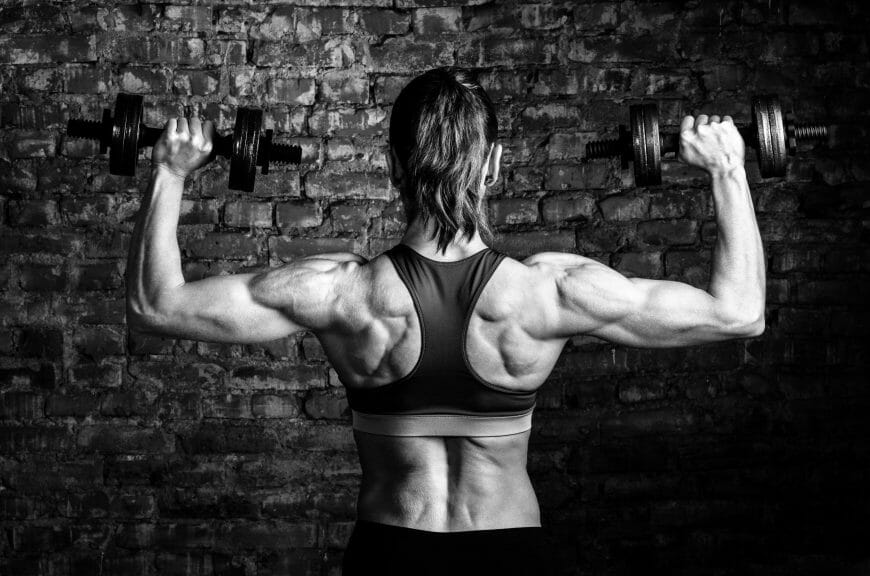When my friend first suggested I join the weightlifting club at our university with her, I was hesitant. I never lifted, except for during my annual spurt of motivation to use my mom’s handheld weights, safely tucked away from the judging eyes of a community gym. The idea of other people seeing me struggle while they lifted huge barbells over their heads, stacked with heavy discs on either side, was a bit intimidating.
Deep down, however, I knew I wanted to do it. I ultimately accepted my friend’s invitation, despite my worries. It was a sport I admired, and everyone starts somewhere. If they could do it, I could do it.
Who, you may ask, is “they?” I am referring to the numerous female weightlifters dominating the spheres of social media, an endeavor previously highly associated with men. Muscular women are on the rise on TikTok “for you” pages and on Instagram “explore,” as well as in my own following feed. They inspire young women like myself to be a little less afraid of the gym, particularly the weight room. The knowledge that friendly faces could reside at the gym, rather than an intimidating sea of judgmental eyes, is comforting.
Hitting the Gym on Social Media
Women in weightlifting has grown in popularity as of late. Such influencers are gaining traction on popular social media sites such as TikTok, Instagram, Twitter, and more. Influencer @leanbeefpatty has a massive following of 7.5 million on TikTok and 5.1 million on Instagram. Flooded by positivity for her abilities and physique, Patty posts fitness routines and tips, along with the occasional cosplays of her favorite anime characters. Commenters awe at her both lean and muscular form. Patty states in an interview on the podcast “Bradley Martyn’s Raw Talk” that the photographs she takes of her progress are her own form of “art.”
Rise in Acceptance of Muscular Women
This popularity follows a general trend in preferences toward muscular, lean women. A study conducted by the University of Missouri-Kansas City and published in 2018 found that, as time went on, thin, muscular women were more highly favored over only thin women. Thus, modern trends promote such women, contrasting the craze for “only thin” physiques characteristic of the early 2000s.
Acceptance of more muscular women is beneficial in several ways, as it opens doors to those who wish to build strength. Women not only faced societal barriers in the gym but professional blockades as well. Women’s weightlifting was not added to the Olympics as an event until the year 2000. Men’s weightlifting debuted at the first modern Olympics Games in 1896. As the public looks more favorably upon female weightlifters, those with more muscular bodies may feel more comfortable in their own skin.
Addressing Backlash to Strong Women
It is notable that the study highlights preferences for muscular and thin body types. This does not account for larger muscular women. Such trends may simply result from continued objectification of women’s bodies. This sees them as commodities that come and go rather than a human person. The praise of one body type over others adds yet another physical standard for women to meet. It places a new pressure rather than empowering those in pursuit of health via the weight room.
This is evident in backlash on social media platforms toward muscular female creators, especially those who do not fit the aforementioned criteria. While there are certainly supportive fans, some commenters continue to equate muscular women to men and degrade their appearances. Women who are too muscular are subjected to harsh words. Influencer Courtney Crawley (@fitzcourtknee on Instagram and TikTok), with 145 thousand followers on TikTok, addresses this masculinization in a TikTok which gained 2.3 million views. The text of the video declares that “muscle doesn’t have to be masculine.” She flexes her strong arms to prove her point. Courtney continues to post, not letting the occasional hate comment stop her from doing what she loves.
Professional athletes are excellent examples of fitness in all forms, including larger muscular women. Sarah Robles (@roblympian on Instagram) is a three-time Olympian who won the first weightlifting medal for America in 16 years. She considers her victory a win for “women of size,” challenging the misconception that fitness and thinness are the same.
Looking Forward
While there will always be haters, positive representations of muscular women still persist. My personal favorite is Luisa from the 2021 Disney film Encanto, a movie about a Colombian family with magical blessings. Luisa is gifted with strength. She helps her family with her power and is beloved by the townspeople. Her character is a fan favorite, uplifting a representation of femininity not previously explored enough by the film industry.
As I continue to go to the gym, I encourage myself to focus on my form during squats, rather than my bodily form in the mirror. It is difficult not to think about the thin, muscular ideal for women while working out. Superficiality abounds anywhere and everywhere. We continue to look toward a world where bodies are not seen as trends but rather part of our human selves, a vessel we care for instead of judge.






